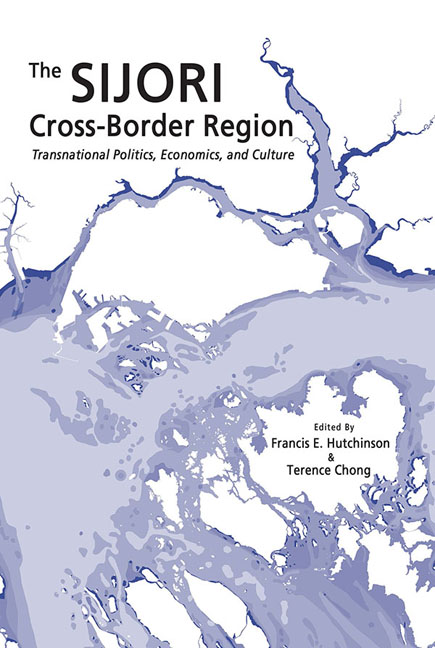Book contents
- Frontmatter
- Contents
- List of Maps
- List of Tables
- List of Figures
- Foreword
- Acknowledgements
- Contributors
- Abbreviations
- Introduction
- Section I Understanding the Whole
- Section II Policy and Politics
- Section III Cross-Border Social and Cultural Communities
- Section IV Formal and Informal Economies
- Map5
- 13 The Airport and the Territory: Transnational Flows in the Singapore- Johor-Riau Cross-Border Region
- 14 Revisiting Industrial Dynamics in the SIJORI Cross-Border Region: The Electronics Industry Twenty Years On
- 15 Development in Johor and Singapore's Water Access: Challenges and Opportunities
- 16 The Role of Ethnic Chinese Business Networks in the Regionalization Strategy of Singaporean Fish Farming Firms
- 17 Pirates and Law Enforcement Agencies: Complex Relations Across the Malacca Straits
- Conclusion
- Appendix
- Sources for the SIJORI Maps
- Index
15 - Development in Johor and Singapore's Water Access: Challenges and Opportunities
from Section IV - Formal and Informal Economies
Published online by Cambridge University Press: 22 July 2017
- Frontmatter
- Contents
- List of Maps
- List of Tables
- List of Figures
- Foreword
- Acknowledgements
- Contributors
- Abbreviations
- Introduction
- Section I Understanding the Whole
- Section II Policy and Politics
- Section III Cross-Border Social and Cultural Communities
- Section IV Formal and Informal Economies
- Map5
- 13 The Airport and the Territory: Transnational Flows in the Singapore- Johor-Riau Cross-Border Region
- 14 Revisiting Industrial Dynamics in the SIJORI Cross-Border Region: The Electronics Industry Twenty Years On
- 15 Development in Johor and Singapore's Water Access: Challenges and Opportunities
- 16 The Role of Ethnic Chinese Business Networks in the Regionalization Strategy of Singaporean Fish Farming Firms
- 17 Pirates and Law Enforcement Agencies: Complex Relations Across the Malacca Straits
- Conclusion
- Appendix
- Sources for the SIJORI Maps
- Index
Summary
INTRODUCTION
The flow of people, goods and capital across political boundaries continues to deepen and expand. The Singapore-Johor-Riau (SIJORI) Cross-Border Region exemplifies this expansion, and growing integration is creating a myriad of impacts for the region's people and parent states (Rizzo and Glasson 2011; Ibrahim and Ali 2013; Pomfret 2011). Enmeshed in this growing connectivity are the inescapable ways that natural resources and environmental systems likewise transcend political boundaries. In the SIJORI region, environmental stresses in the form of haze from forest fires (Ewing and McRae 2012), smog from transportation, and effluents from industrial processes (Sembiring and Ewing 2014) all have the potential to cross boundaries. Environmental systems also create the potential for symbiosis, which is manifest in SIJORI most clearly in the water sector.
Singapore has depended on water imports since its founding, and has looked to the relatively water abundant neighbouring catchments in Johor and Riau as key parts of the solution. Johor came to dominate Singapore's external water sourcing, with Riau showing potential as an additional or alternative supply that has been explored but not made operational. This chapter focuses on Singapore's water imports from Johor, and investigates the potential impacts of Johor's economic growth and attendant social changes on future water supply to Singapore.
The chapter begins with a snapshot of the Singapore-Johor water relationship alongside Johor's rapid development, emphasizing its origins, drivers and primary characteristics. It then explores how these developments relate to the water resources upon which Singapore currently depends, from both quantity and quality perspectives. The latter half of the chapter analyses the wider relationship between Johor and Singapore — both as partners and competitors — along with the role that Riau has played as a potential water source. The chapter concludes with guiding questions for future thinking on how these parties might manage shared resources and further economic integration.
BACKGROUND TO THE SINGAPORE-MALAYSIA WATER RELATIONSHIP
Johor has experienced phenomenal economic growth in recent years. This is a reflection of Malaysia's national economic growth trajectory, the presence of delineated growth corridors in the state, and Johor's dynamic relationship with Singapore. While Johor's growth has positive aspects on both sides of the border, there are also a number of questions about how rapid development in the state might affect the quantity, quality and price at which water is supplied to Singapore in the future.
- Type
- Chapter
- Information
- The SIJORI Cross-Border RegionTransnational Politics, Economics, and Culture, pp. 393 - 410Publisher: ISEAS–Yusof Ishak InstitutePrint publication year: 2016



